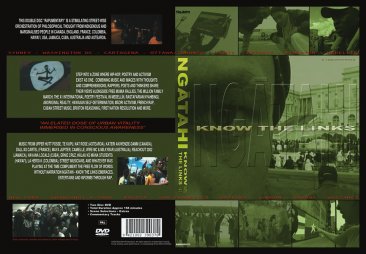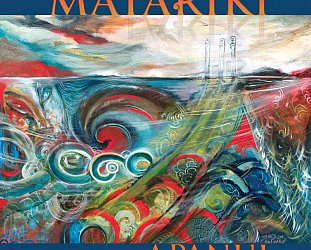Graham Reid | | 3 min read

Technology may have made the world smaller, but it has also divided it. Consider this: if you are a Satan-worshipping death-metal band in Sweden (and there are an alarming number) you can now have a valid and validated career by selling your music on the internet to like minds across the planet.
But at the same time you are also marginalised by simply feeding the same agenda. You needn't engage with the world, it has engaged you through cyberspace.
Your work and opinions don't have to endure or enjoy any critique, they have found their unquestioning fan base. It may look otherwise, but yours is a very small, if slightly profitable, world.
If that happens with New Zealander Dean Hapeta's Ngatahi: Know the Links it would be a shame.
Hapeta -- frontman for the Upper Hutt Posse and also a musician/spoken-word artist under the moniker Te Kupu/The Word -- hasn't approached film festivals or television companies to screen his ambitious project.
He figures (and he's probably right) that they'd just turn him down so it's hardly worth the hassle. Just put it onto the net and a few local stores and lets it find its audience.
How that audience knows about it is the question - but here's hoping.
The international hip-hop community will doubtless hear about it through cyberspace, and what Ngatahi reminds you immediately is that hip-hop isn't just a style or attitude but an international movement.
If death metal from Sweden strikes a chord with like minds in Southland, then so does hip-hop. Attitudes to culture within the hip-hop world are remarkably similar everywhere.
So what Hapeta has done is take his camera and political attitude on a global jaunt to find like-minded activists and thinkers in Ottawa, Detroit, Kingston, Bogota and other far-flung places.
The first thing to acknowledge is it looks great. Out of what must have been hundreds of hours of material, Hapeta has boiled down nuggety political essences. He manages to make them spring to life on the screen as the voices of real people - in their homes, on the street, at political rallies - who are angry, righteous and heard and seen within their own contexts.
Not everything is pretty of course - in fact very little of it - but it makes a refreshing change to see another view of Cuba or Paris than the postcards and hear such articulate voices in the milieu which created them.
As with anyone who has a political agenda, Hapeta goes looking for what he wants to find, and there's nothing wrong in that.
So what you get are the same series of -isms recited like a mantra: imperialism, colonialism, racism etc
But over the long haul - and episodes of two discs running well over two hours is quite some haul - rather than become tedious by repetition it actually reinforces the agenda and will be provocative for those who somehow think Maori political aspirations, especially tino rangatiratanga, are just some isolated and troublesome localised movement.
There is rap throughout of course, not all of it in English -- which underscores the tyranny and shortcomings of those who speak and think only in that global language.
But mostly this is about distinctive and distant voices speaking the same language of minorities under the thumb or boot of a dominant culture.
It may be serious but it's also interesting and funny - and you are allowed to be suspicious about how much some of these people know about Aotearoa/New Zealand yet still feel qualified to comment.
But that's the message: all different but something in common.
And it inevitably leads back to activism in Aotearoa.
Hapeta is a feisty, opinionated and provocative musician and film-maker and we'd be the poorer without him and his like. But let's hope this doesn't languish on shelves or only find it's place with its own global community.
Seek it out here. It's a lot more interesting -- and some might argue more dangerous -- than Satan-worshipping Swedish death-metal.







post a comment